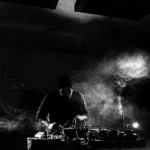 Torba, the project of Italian sound artist Mauro Diciocia, has been in existence for almost ten years now and has gone through a number of transformations over time – what began with heavy, harsh guitar drones at the end of the last decade, soon led into the most extreme realms of harsh noise, just to make way for a multi-layered music based on sampled sounds, in which subtlety and grotesque hold the balance. What moves like a red thread through all his work has less to do with techniques and stylistic features than with a creative attitude, in which concepts and master plans have little space. It’s a spontaneous improvisational spirit, which is also reflected in the rousing and often leaping dynamics of his sound collages. This and much more is subject of the following interview.
Torba, the project of Italian sound artist Mauro Diciocia, has been in existence for almost ten years now and has gone through a number of transformations over time – what began with heavy, harsh guitar drones at the end of the last decade, soon led into the most extreme realms of harsh noise, just to make way for a multi-layered music based on sampled sounds, in which subtlety and grotesque hold the balance. What moves like a red thread through all his work has less to do with techniques and stylistic features than with a creative attitude, in which concepts and master plans have little space. It’s a spontaneous improvisational spirit, which is also reflected in the rousing and often leaping dynamics of his sound collages. This and much more is subject of the following interview.
Before you started with your project Torba, you studied film, but you were also interested in music for a long time, as far as I know mainly in Hardcore and Metal. Although Torba went into a quite different direction, I guess all these things were inspirational and still are. Which traces of these early interests do you find in your recordings?
I‘ve always been a voracious listener and I usually don‘t like to restrict my interests in prepackaged containers such as music genres or subcultures but of course I had my metal years during the high schools and I also had an affair with the punk/HC scene for a while; despite this, I believe it‘s very hard to pinpoint concrete traces of those music styles inside torba, also because I‘ve started this project with the clear intent to unlearn all the previous music lessons and start a completely new path. You can potentially track back those influences and attitude in the same way you can put sugar and coffee in a sort of relationship.
If I remember it correctly, you founded Torba around that time period, as you moved from Rome to Berlin. In what kind of music environment have you been in that time, when you played your first Torba gigs?
I started torba in Rome, around the fall of 2008/ealry 2009 proposing guitar-riff compositions pretty much inspired by Earth, Nadja, Skullflower, Sunn O))) and blended with some feeble noise/electronic element. My first self-released CDr came out in April 2009, according to Discogs. Rome had a very nice music milieu on those days: the noise-rock scene was truly exploding and at the same time bumping into the rising noise/drone trend. I had the feeling, at some point, that anyone living around the Pigneto area was in a band.. Nevertheless my life was shit under a financial and social status, so I moved to Berlin in November 2009 and I played the first torba show later that winter: it was an house-concert in Berlin Friedrichshain, guested by Alberto Panegos/Nube.
Most of your recordings are based on found and treated sounds, on newer records often accompanied by acoustic instruments like the cello or the piano. Among all the street scenes, household sounds, animal voices and labour noise, do you have some preferred settings to search out for new material?
Not really.. it‘s hard to analyze the cognitive work behind the building of a soundscape but it‘s worth mentioning that most of the times when I collect or place an element inside a structure I don‘t care that much about the „message“ inside the sound (the signified) but I rather focus on his spectral and physical qualities such as tone, frequency, loudness, duration, etc.. (the signifier). Once collected in my gears, any sound element get rid of the meanings it has in his original context and become a character of a new narration.
When you go finding sounds, who is the boss, you or the sounds? In other words, do you just see what is there and so get your ideas of turning it into music, or do you sometimes also have kind of a “master plan” and search in a more targeted, purpose-driven way?
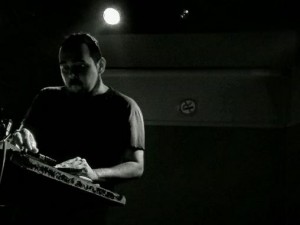 Never had something like a plan.. I don‘t feel like a hunter, I see myself more as an observer or better, a meticulous listener: if something catch my attention, I push the red button. Most of the newest material is not even collected with a professional microphone but simply through my smartphone. This means that extremely rarely, nowadays, I go for field-recordings safari in charming places around the globe, I really like to work with (apparently) worthless everyday sounds, trying to get the best result from their natural property and processing them in a very simple and analytical way.
Never had something like a plan.. I don‘t feel like a hunter, I see myself more as an observer or better, a meticulous listener: if something catch my attention, I push the red button. Most of the newest material is not even collected with a professional microphone but simply through my smartphone. This means that extremely rarely, nowadays, I go for field-recordings safari in charming places around the globe, I really like to work with (apparently) worthless everyday sounds, trying to get the best result from their natural property and processing them in a very simple and analytical way.
Over the years, the main focus of your music shifted from rather harsh noise to a more delicate work with sound collages. Do you think this is a result of your growing experience in working with sounds, or can you also trace this back to some external influences?
Both. Torba is probably the main mirror I use to reflect my musical and non musical influences and tastes, along with my feelings, my own personality.. and of course all this things are in perpetual motion. You pointed out only one part of the road: from an harsh noise phase to a more delicate sound-collage development, but I can ensure you that torba will never be the same, as it has never been so far..
Some of the techniques you use, you find also among some Post-Industrial artists. Do you see a parallel to this scene?
I don‘t like labels so I might be very caustic here: of course torba can fit in between the post-industrial coordinates, simply because what we refer to as „post-industrial“ is a post-genre/non-genre including sounds and attitudes diametrically opposed that allow to lay on the same shelf a young swedish hipster freaking out with tape loops made out of other people music and a self-proclaimed godfather of dark ambient creating chaep‘n‘catchy 90s style electronic symphonies through high priced instant-vintage synthesizers.
One thing that I particularly notice and admire in your compositions is your dealing with aspects of time. The use of suspense, phases of retardation, relatively sudden tempo shifts and even more sudden breaks and reset-like new starts always sounds, as if everything just happens in the right moment. These things must play a role for you, either unconsciuously or by decision. What are your ideas on this?
I take it as a huge compliment, so first of all thanks a lot! A few years ago I released a tape for the australian label Mazurka Editions (now Vienna Press) called „discontinuity abuse“.. I don‘t wanna sound too pretentious now, but that title it‘s sort of a manifesto of my sound aesthetics and of course I‘m totally conscious about the essential role the components you mentioned play in my compositions. It could make you smile but during my live performances there‘s always someone from the audience who will experience those elements as a flaw and I can‘t make anything better to save my ass then think obsessively about those over-abused but always meaningful Wittgenstein words (the limits of my language mean the limits of my world).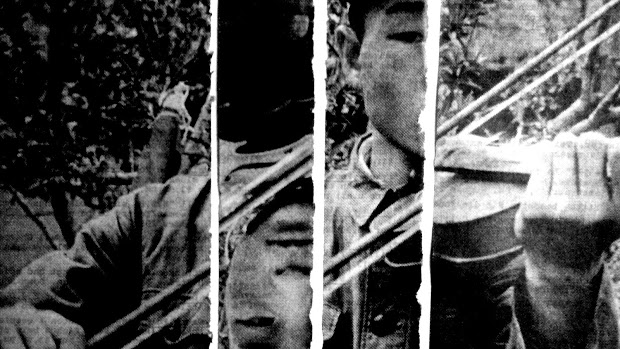
In a review I compared your economy of suspense, increasing tempo and stop at a peak to the therapy concept of French psychoanalycist Jacques Lacan, who stopped his patience’s consultation-hours always at the most intense moments, be it after ten minutes or three hours. Can you live with this far-fetched reference, as it was meant a bit tongue-in-cheek?
Sure man, you know me good enough to know how much I love adventurous comparisons like this! Jacques Lacan is such a cornerstone for our age, you can connect barely everything to his theories and thoughts. I’d be lying if I mentioned Lacan’s works as a direct reference for torba but I must confess that the few of his seminars I‘m familiar with have had a strong impact on my personality and some elements may perhaps show up in my creative behaviors. But probably you should be a Lacanian to know how to grasp it. Ahaha.
Are concerts of the same importance for you than recordings, or do you tend more to one of the two sides of your output?
Both sides are important but the live action has a surplus value from my prospective.. Going on stage with torba is a shock therapy against my lack of self-confidence and I really need it in order to keep the rest of my social life in a decent balance. Studio recordings are mere documentations of my aesthetics research: a sophisticated souvenir if I may put it in this way.
Is Torba a solo project by definition, or have you also jammed with others live or in recording?
In my early Berlin days I jammed live a few times with some friends like Tatsumi Ryusui, M!, Iku Sakan, Severin and I also released a 7“ collaboration with Vomir, but this has probably nothing to do with your question? Torba is my solo project by definition, yes.
Often your pieces have very cryptic titles, that could be words in some unknown language or neologisms, that might allude to something or might not. I think some folks search for a meaning (or at least think they should), while others may interpret this as total nonsense. What are the rules and ideas behind your playing with words?
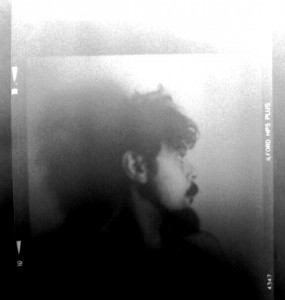 There are no strict rules behind this and I can ensure you that this adoption was very natural in the frame of the constant development of my sounds toward pure abstraction and autism, a land where the hieroglyphic contents of an apparently senseless word could be more effective than the syllabic language, which forces you to connect the sign to concrete meanings. It‘s a plain segment of the aesthetics I‘m trying to build in a very spontaneous manner and this visual content match coherently with the way I make use of field recordings (see above!).
There are no strict rules behind this and I can ensure you that this adoption was very natural in the frame of the constant development of my sounds toward pure abstraction and autism, a land where the hieroglyphic contents of an apparently senseless word could be more effective than the syllabic language, which forces you to connect the sign to concrete meanings. It‘s a plain segment of the aesthetics I‘m trying to build in a very spontaneous manner and this visual content match coherently with the way I make use of field recordings (see above!).
In the discourse about sound based music, you still notice a distinction between musicians with a highbrow academic background and those who have a more autodidactic, “punkish” d.i.y. approach – maybe not explicitly, but more in the sense of who mentions whom and who plays with whom etc. Though in some cases this might make sense, it is mostly made up by clichés and leads to much too fixed categorizations. In Torba’s case I couldn’t make such pigeonholing. Do you sometimes experience categories like these as boundaries?
Yes I do, and it does not start from me: even in the presumed land of the free which experimental music represents in the common thinking you need to choose your colors in order to became a saleable product and keep doing your stuff. When your output is too hard to categorize, you can easily fall in a bothersome isolation and unfortunately torba is too arty-farty for the noise scene, too noisy for the art environment, too cheap for the Academy. I‘m walking on that slender border in between those three regions and none of them seems to accept my work in its entirety. The lack of which they always complain is exactly what you are talking about: clichés. On the other hand, and I’m very honest here, it‘s extremely challenging and inspiring that feeling of always being in the wrong place.. this keeps your mind, and consequently your creativity, steadily active and responsive.
The majority of your recordings appear on the medium tape. Do you – as someone who works with tapes anyway – have a certain fondness for it? As you released on your own label and on other ones, I guess it’s not just a compromise to the people you work with..
I really love cassettes and tapes in general. I also have a 1/4“ reel to reel tape-recorder in my studio that I don‘t like to bring on stage due to its heavy weight. Although I will never cease to use tapes to play my live shows as well as for domestic listening, I really feel the need to release a full length CD or a 12“ one day and I really hope it will happen soon!
It seems that you have (at least temporarily) stopped the activity of your label Aaltra Records, which you ran for a couple of years earlier this decade. What led you to this decision?
I‘ve started Aaltra as a support label for torba and incidentally to release some interesting stuff from people I was in contact with (Vomir, Torturing Nurse, Barrikad, Dave Phillips, etc..) but I want to be very honest concerning this topic: I like the idea about running a label but I‘m very bad in doing it, that‘s way Aaltra Records has closed down. I prefer to focus on more creative activities rather than follow business plans.. I know for some poeple having a label it‘s an excercise of pure devotion and support to some obscure internet circle they call „scene“ but it‘s a kind of effort which doesn‘t give me any kind of satisfaction or payback. Should I feel ashamed for this?
Was there a release you find outstanding and particularly worth remembering?
All of them in a way, none of them on the other hand.. As you might deduce from my previous answer, while Aaltra was releasing music I had very mixed feelings about what I was doing. I‘m happy that nowadays it isn‘t active as a label anymore.
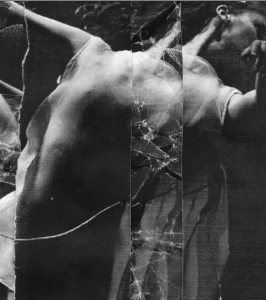 Aaltra operates now as a booking project for experimental music and multi-media in your new place in Lecce in the South of Italy. What can you tell us about your activities there so far and about your ideas for the future? What kind of local scene and audience is there?
Aaltra operates now as a booking project for experimental music and multi-media in your new place in Lecce in the South of Italy. What can you tell us about your activities there so far and about your ideas for the future? What kind of local scene and audience is there?
Together with my partner Sonia, I‘ve exhumed the word Alatra to name a multidisciplinary project/container focused on audiovisual research and exploration of sonic languages. We just started with a collective sound-art exhibition and a few concerts: people like Marcellvs L., Todd Anderson-Kunert, Gaspare Sammartano (ex Cannibal Movie), Alessandra Eramo were involved in this first step. We have tons of new ideas and some events already coming up including screenings/retrospectives, live shows, sound performances, more exhibitions, etc.. You can easily find us on FB or Instagram to get more informations about. A local experimental scene doesn‘t exist at all in Lecce, outside of very few names (you might perhaps know Donato Epiro). There is a small but dedicated audience which give me some hope for our future activities..
Berlin, where you have stayed for quite some years, is maybe a bit saturated with adventurous (and fake-adventurous) music, and in many cases, it seems that everything has a subculture of it’s own, where people have unlearned to notice things beyond their own nose. Yet you can’t blame it for not being inspirational. What are the main experiences that you took with you from here?
I don‘t want to mention anything in particular but the general post-D.I.Y. atmosphere of the town which push creative minds to operate with the solid awareness that the action of making is the core of the thing, not the resulting product. This (let‘s call it existentialist?) approach to creativity and communication is still frowned upon in Italy, especially in the south. More than a life lesson, the eight years I spent in Berlin were a mere confirmation of some of my assumptions and inclinations: everything can be done in a very uncomplicated way if you are driven by a sincere urge. It doesn‘t need to be fancy, it just needs to be real.
You seem to have a big connection to musicians from Scandinavia. How did this happen and what’s the appeal of stuff that comes from this part of the world?
The Scandinavian noise scene, in particular the Danish-Swedish axis, was the next big thing a few years ago (and for somebody still is..), it was therefore almost unavoidable to bump into some of its ambassadors on those days. I shared the stage with a lot of this guys (Puce Mary, Croatian Amor, Damien Dubrovnik, Sewer Election, Händer Som Vårdar, Sand Circle, Arv & Miljö, Neutral to name a few..) and I‘m still in contact with some of them. I‘ve also enjoyed a lot of good recordings coming from that side of Europe and I could even consider some stuff (like the last 10 years of Dan Johansson/Sewer Election) an actual influence for torba, but I don‘t see this big connection at the end of the day.. I never released my music on a Scandinavian label, for instance!
As to the future, is there already some new stuff by Torba in the making?
In the last two years I‘ve been declining a lot of tape deals because I‘m totally focused on two different works I really would like to print on CD. I‘m also experiencing some new adventures like playing a live soundtrack for a movie and a few other not-confirmed projects I don‘t want to talk about. I‘d like to use this last line to thank you guys for the space and your interest! Keep up the good work!
(U.S.)
Fotos: Sonia Martina
